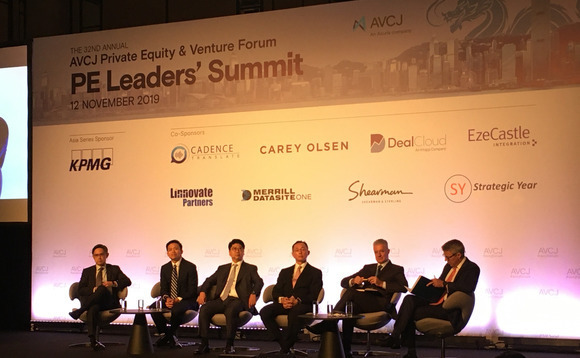
GPs see specialization as antidote to challenging market - AVCJ Forum

Investors at the AVCJ Forum offered optimistic outlooks for 2020 but said tighter deal markets would demand specialization in defensive sectors and a closer watch on valuations.
Looming signs of recession, high levels of dry powder, a lack of clarity around exits, growing competition for deals, and generally waning sentiment were flagged as the top concerns in a panel on the outlook for private equity in Asia. They have contributed to an environment where investors were underwriting more cautiously than a year ago, despite high levels of liquidity implying a seller's market.
Teck Sien Lau, a partner and CEO at Hopu Investments, said that he expected an L-shaped market in the near term, not as negative as a financial crisis but characterized by low asset inflation and valuation wariness. Deal targeting in this context will be further pressured by rising participation in M&A markets by new GPs, corporates, government players, and other platforms.
"I think the market's getting challenging. Buyers are getting careful about what they buy. Are you buying a brand name, management, cash flow, or what exactly," Lau said, evoking the case of co-working start-up WeWork, which has seen its valuation tumble from $47 billion to $7.9 billion in recent weeks. "What happened with WeWork has caused everybody to ask, 'What are you paying for?' If it's a company that has a great business model, but it still has not registered profitability, that will give people more caution when paying high valuations."
Boon Chew, a managing partner at CITIC Capital Partners, said that specialization would be a key theme, particularly in China, where most GPs are still generalists by industry or strategy. This shift will be accelerated by the need not only for differentiation in a crowded market but also for a better understanding of valuations in targeted investments and meaningful contributions to growth during the holdings period.
"In the short term, it's just going to be a focus on finding a way to grind out proprietary deals," Chew said, noting that the last auction his firm won was in early 2018. "So we're forced to focus on themes. We try to do rollups as well. There may be more complicated carve-outs. You have to focus on post-investment value-add and focus on core relationships you feel that other people can't duplicate."
More attention on operations and specialization is expected to result in more platform-style strategies, which are seen as useful in bridging the gap between what investors are willing to pay and what sellers will accept. The trend will be most noticeable in fragmented segments, where consolidation is most plausible, but not exclusively so.
Industry participants said they expect sector targeting in the year to come to focus on defensive areas, including healthcare and food, but also industries associated with rising spending power in Asia such as education. It was noted that several sales processes in education are currently underway in Vietnam alone.
"There is a greater discernment in terms of what sectors the buyers will invest in," Brian Hong, a partner at CVC Capital Partners, adding that one of his firm's tactics for coping with rising competition is doubling down on existing portfolio companies. "If you have a business that has exposure to export volumes, it's trade-sensitive or commodity-sensitive, those assets will generally struggle to find buyers."
Tatsuo Kawasaki, a founding partner at Unison Capital, noted that his firm has gradually started to invest with a tighter sector focus and is now using a platform approach to the healthcare sector in both the pharmacy and hospital segments. This strategy is facilitating investment at lower entry valuations and is expected to be replicated in other categories.
"Once we set up a group of medical-related executives, we basically become insiders through them, and then we start acquiring small hospitals," he said. "We just made our first one, and we see more than a handful of similar hostels in the pipeline, having direct discussions rather than auctions."
Kawasaki added: "The million-dollar question is how can we encourage business owners, whether its conglomerates or individuals, to sell their assets."
Latest News
Asian GPs slow implementation of ESG policies - survey
Asia-based private equity firms are assigning more dedicated resources to environment, social, and governance (ESG) programmes, but policy changes have slowed in the past 12 months, in part due to concerns raised internally and by LPs, according to a...
Singapore fintech start-up LXA gets $10m seed round
New Enterprise Associates (NEA) has led a USD 10m seed round for Singapore’s LXA, a financial technology start-up launched by a former Asia senior executive at The Blackstone Group.
India's InCred announces $60m round, claims unicorn status
Indian non-bank lender InCred Financial Services said it has received INR 5bn (USD 60m) at a valuation of at least USD 1bn from unnamed investors including “a global private equity fund.”
Insight leads $50m round for Australia's Roller
Insight Partners has led a USD 50m round for Australia’s Roller, a venue management software provider specializing in family fun parks.







